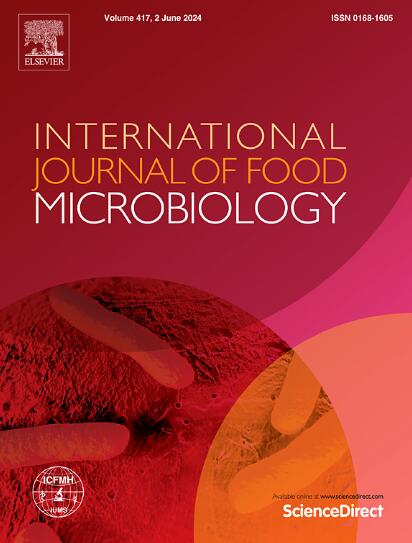Different composition of mannoprotein extracts and their beneficial effects on Oenococcus oeni and wine malolactic fermentation
IF 5.2
1区 农林科学
Q1 FOOD SCIENCE & TECHNOLOGY
International journal of food microbiology
Pub Date : 2025-08-19
DOI:10.1016/j.ijfoodmicro.2025.111401
引用次数: 0
Abstract
Malolactic fermentation (MLF) is a biochemical process in winemaking where lactic acid bacteria (LAB) convert L-malic acid into L-lactic acid and carbon dioxide, contributing to the deacidification and microbiological stability of wine. Oenococcus oeni, the main bacterium responsible for MLF, must deal with challenging conditions such as high ethanol concentrations, low pH values and low nutrient availability. In this study, the effects of commercial mannoprotein extracts derived from the yeast Saccharomyces cerevisiae on the MLF were investigated. Three commercial mannoprotein extracts were used to study the effects of different O. oeni strains on the MLF in wine-like media. The results revealed that the type and concentration of mannoproteins present in the extracts significantly influence the rate of L-malic acid consumption and the duration of MLF. The characteristics of the mannoproteins, such as their molecular weight, monosaccharide composition and protein content, varied among the products, affecting their ability to promote MLF. This study highlights not only the potential of mannoproteins to improve MLF but also the importance of the selection of an extract with adequate composition characteristics to benefit the process.
甘露蛋白提取物的不同组成及其对酒球菌和葡萄酒苹果酸乳酸发酵的有益影响
苹果酸乳酸发酵(MLF)是乳酸菌(LAB)将l -苹果酸转化为l -乳酸和二氧化碳的生化过程,有助于葡萄酒的脱酸和微生物稳定性。酒球菌是造成MLF的主要细菌,它必须应对高乙醇浓度、低pH值和低养分利用率等具有挑战性的条件。本研究研究了从酿酒酵母中提取的甘露蛋白提取物对MLF的影响。采用三种市售甘露蛋白提取物,研究了不同菌株对酒样培养基中乳酸菌生长的影响。结果表明,提取物中甘露蛋白的种类和浓度显著影响l -苹果酸的消耗速度和MLF的持续时间。甘露糖蛋白的分子量、单糖组成和蛋白质含量等特性因产品而异,影响了其促进MLF的能力。这项研究不仅强调了甘露糖蛋白改善MLF的潜力,而且还强调了选择具有适当组成特征的提取物以使该过程受益的重要性。
本文章由计算机程序翻译,如有差异,请以英文原文为准。
求助全文
约1分钟内获得全文
求助全文
来源期刊
CiteScore
10.40
自引率
5.60%
发文量
322
审稿时长
65 days
期刊介绍:
The International Journal of Food Microbiology publishes papers dealing with all aspects of food microbiology. Articles must present information that is novel, has high impact and interest, and is of high scientific quality. They should provide scientific or technological advancement in the specific field of interest of the journal and enhance its strong international reputation. Preliminary or confirmatory results as well as contributions not strictly related to food microbiology will not be considered for publication.

 求助内容:
求助内容: 应助结果提醒方式:
应助结果提醒方式:


